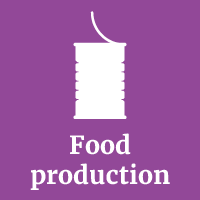
The Microbiome Sustainability - Quiz
Microbes may be invisible to the human eye, yet they live in all environments on Earth. From human and animal bodies to soils, rivers, oceans and deserts. Microbes populate even the most extreme corners of this planet. Because they perform many, often critical, functions in the environments in which they live, the abundance and diversity of microbiomes is essential to keep our global ecosystems alive and healthy. Climate change and other environmental disturbances are significantly changing the microbial communities of animals, plants, soils and oceans. Thus, microbiomes not only influence their environment, but the same also applies vice versa! But what is this mutual relationship based on? We are here to find out!
Microbiome Sustainability Quiz
Question 1 |
How do soil microbes influence climate?
A | They absorb and release greenhouse gases |
B | They have no effect on climate |
C | They emit UV radiation |
Question 1 Explanation:
Microbes are involved in the cycling of carbon and other nutrients in the soil. Some microbes are responsible for fixing gases from the atmosphere and incorporating it into organic material in the soil, whilst other microbes decompose this material to provide nutrients for the plants, thereby releasing gases back to the atmosphere. Higher temperatures, droughts, increasing rainfall, etc. caused by climate change however can create an imbalance in this natural cycle.
Question 2 |
Why are marine microbiomes so important for our planet’s health?
A | They fix CO2 from the atmosphere and produce oxygen |
B | They provide the ocean with energy and nutrients |
C | Both |
Question 2 Explanation:
Marine microbiomes are the major processors of the world’s greenhouse gases and supply most of the oxygen we breathe. They serve as food for other organisms and are involved in the recycling of nutrients in the ocean. All these functions make them essential for the health of our planet’s ecosystem.
Question 3 |
How can microbes help with sustainable energy supply?
A | Thanks to their ability to produce biofuels |
B | They can provide energy using wind power |
C | They can use the sun’s energy to produce solar power |
Question 3 Explanation:
Through fermentation microbes can convert sugars and starch into biofuels, an alternative to fossil fuels. Because microbes can also feed on food and agricultural waste, grasses, sawdust and other non-edible plant waste to produce these biofuels, we can at the same time decrease the amount of waste.
Question 4 |
In agriculture, microbes can be used to fight off…
A | Pests and diseases |
B | Insects and weeds |
C | All the above |
Question 4 Explanation:
Microbes are excellent at protecting plants from their enemies in a variety of fashions. Sometimes by directly killing them, sometimes sneakily by making them unable to procreate. They can therefore be used as an alternative to chemical pesticides, which can contaminate soils and rivers.
Question 5 |
Damage done to microbiomes negatively affects global warming. True or false?
A | That is right! |
B | Only partly true |
C | No, there is no link between both |
Question 5 Explanation:
True, there is a strong link! Microbiomes of plants, trees, soils and oceans are responsible for capturing and storing carbon dioxide (and other forms of carbon) from the atmosphere. When these microbiomes are damaged, it weakens their capacity to store CO2. As a result, CO2 accumulates in the atmosphere where it traps heat, ultimately contributing to rising temperatures and global warming.
There are 5 questions to complete.
You have completed
questions
question
Your score is
Correct
Wrong
Partial-Credit
You have not finished your quiz. If you leave this page, your progress will be lost.
Correct Answer
You Selected
Not Attempted
Final Score on Quiz
Attempted Questions Correct
Attempted Questions Wrong
Questions Not Attempted
Total Questions on Quiz
Question Details
Results
Date
Score
Hint
Time allowed
minutes
seconds
Time used
Answer Choice(s) Selected
Question Text
All done
Need more practice!
Keep trying!
Not bad!
Good work!
Perfect!



